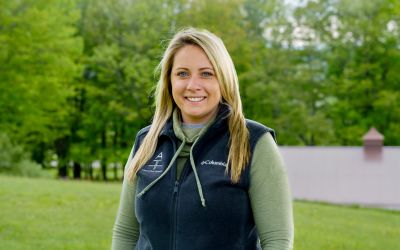Forester Spotlight: Aimee Tomcho
Next up, we’re highlighting Aimee Tomcho in our Family Forest Carbon Program Forester series. Part of our Forestry team, Aimee is committed to helping landowners manage healthy woodlands and answer any questions about your property. She’s based in North Carolina, working with family forest owners throughout the Southeast.
Aimee Tomcho
State: North Carolina
Educational background: BS in Forestry and Wildlife Science from Virginia Tech & an MS in Forest Resources Management from Clemson University(Research: Fire Ecology)

Aimee Tomcho stands in a healthy woodland wearing her American Forest Foundation jacket.
Aimee began her career as a wildlife biologist. She has always enjoyed applied science and found herself concentrating on habitat conservation and management. Many species depend on forests at some stage in their life and Aimee realized she could make the broadest positive impact at the ecosystem level. “I like to think my work as a forester is enhanced by the time I spent studying the acute details of flora and fauna as components of a healthy and functional forest,” she says.
When it comes to forestry, she’s passionate about ensuring that private forest owners are supported in the work they do to sustain the world’s forests. In the southern U.S., more than 85% of forestland is privately-owned. Despite being some of the most diverse and productive forests in the world, there has never been an adequate way to quantify the value of forests and the ecosystem services they provide. It can be difficult to decide the value of ecosystem services, but some benefits like water quality and storm resiliency are clear advantages. Yet after decades of work in this sector and watching landowners struggle to retain their ownership, the economic value of forests is not measured at what she believes to be a fair value.
Private lands make both natural and financial ecosystems function. How can we reward the stewards, support their endeavors, and maintain a visible set of science-based standards that amplify the incredible natural resources we have around us? Aimee believes forests are a major solution to our climate crisis. She thinks that fortifying a market that quantifies the value of forests, considering both active carbon sequestration and wood product carbon storage, is both the answer and the gateway to understanding how to better quantify the value of other ecosystem services.
Aimee says, “The magic of forests inspires and sustains me in ways words cannot describe. I can think of no better way to spend my life than walking among trees and working to keep forests in the landscape.” And yet, it’s the people with whom she shares her days that make her work most rewarding. Aimee adds, “My extraordinarily hardworking and dedicated AFF colleagues, strong and steadfast landowners, and passionate and knowledgeable partners are all working together to make the working lands benefit everyone.”
And she’s a bird nerd! Aimee believes birds and birdwatching unites people, while offering a profoundly solitary experience. The language of bird song is universal, and birds tell us a lot about the condition of our forests. Aimee loves to answer bird questions, learn about the birds on your land, and identify bird songs with you.
To find out if your property is eligible for the Family Forest Carbon Program’s Field to Forest practice, visit https://familyforestcarbon.org/fieldtoforest/ and please call us at 229-231-3818 or email us at fieldtoforest@forestfoundation.org.
Related Articles

July 14, 2023
Forester Spotlight: Emily Trent
Meet Emily Trent from Pennsylvania! Emily’s forestry expertise is built on a foundation of conservation, environmental biology and education. She has a Bachelor of Science in Ecology, Conservation and Environmental Biology, with a minor in Geography from Indiana University of Pennsylvania.

June 27, 2023
Field to Forest: A New Way to Invest in Traditional Georgia Pine
Let’s talk about Field to Forest, AFF’s new pilot carbon practice in Georgia. Field to Forest is designed to support family landowners in Georgia by planting regional-specific loblolly pine seedlings on marginally productive or difficult to manage pastures and croplands.

March 28, 2022
Forester Spotlight: Sarah Hall
Sarah's passion for forests started at a very young age. After having witnessed the impacts of human development on forestland, she's dedicated her career to helping landowners preserve their forestland for future generations and being a trusted resource throughout their journey.